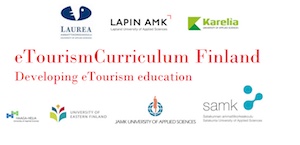E-business in Tourism and Hospitality
This general course provides a wide perspective on the topic of e-business in tourism and hospitality. All the important topics in the field are covered and the course creates an understanding of the connections and contents between different e-business topics, thus providing an overview of e-business in tourism and hospitality.
The sign-in for the course is now open. If you are a tourism student in eTourismCurriculum Finland universities you can sign up for the course at https://www.webropolsurveys.com/S/1B4DA15E1C04CBE3.par Registration is continuous and you will always register for the next time course is organized.
DETAILED IMPLEMENTATION PLAN
Code, name and number of ECTS of study unit
E-Business in Tourism and Hospitality (5 ECTS)
Language of course
English
R&D integration: Commissioner , Level of cooperation and/ or R&D task, Scope (ECTS)
Analysis report and development plan for commissioning party acquired by the student. (scope: 3 ECTS)
Virtuality: Description, Scope (ECTS)
100% (5 ECTS)
Recommended academic year
2nd year
Teacher in charge
Jussi Mertanen, Haaga-Helia UAS
Objectives
This general, 2nd year course provides students a wide perspective on the topic of e-business in tourism and hospitality. This course covers all the important topics in the field and creates an understanding of the connections and contents between different e-business topics, thus providing an overview of e-business in tourism and hospitality. After the course the student knows the central concepts and current development of e-business in tourism and hospitality and what is the role of various online tools in marketing and managing the information and communication technologies used in tourism and hospitality companies. Also the unique features of the tourism and hospitality clusters and their effects on the e-business are covered. After this course the student is able to analyze and evaluate existing e-business solutions and decisions. After this course the student is able to recommend and plan development steps of e-business for a company in the field of tourism and hospitality.
Content
- Comprehensive general review of terms and concepts of e-business
- Strategic and tactical tools for e-business
- Online marketing possibilities
- Customer focus and management
- Social media today
- Risks and risk management
- Technological advances and advantages
Prerequisites
None
Pedagogical arrangements
This online course includes self-guided online lessons, template based analysis and a development plan for an existing company. The course includes also peer reviews and cooperation with a company. The length of this course is one semester.
Materials
– online course materials
– online templates
Assignments
The course is done completely online and divided into three leveled tasks.
The first level consists of basic concepts, terms and tools. These are split into very small topics and studied in self-advancing method. Each topic is explained in a plain, straightforward method with words, pictures and videos. The estimated time needed of each topic is 20 minutes. The students are encouraged to search for more information about the subject from internet. Each topic ends with a multiple choice quiz that ensures the student has understood the topic. There will be about 125 topics (see end of this document) The first level ends with an online multiple choice examination based on all topics. 50% of correct answers is needed to pass. This examination is 30% of the total grade of this course.
The second level consists of analyzing e-business of a company. The student selects the company being analyzed but will not contact the company. The student will receive a suitable general template of e-business topic to fill with observations and own analysis. The filled templates are posted in the net. Each student peer reviews two other similar analysis made by other students The analysis template is graded by the teacher. The weight of the analysis task including peer reviews is 20% of the total grade.
The third level consists of e-business development plan made for a company in the field of tourism or hospitality. The student contacts the company and together chooses what area of their e-business the student will work on. The result is a development plan. The student sends the plan to the company and to the guiding teacher to be evaluated. The company fills a form with their short comments and sends it to the guiding teacher. The e-business development plan made for an existing company is graded by the company and by the teacher. The weight of this task is 50% of the grade.
ASSESSMENT PLAN
Assessed parts and their share of total assessment
- a) online exam (30%)
- b) analysis (20%)
- c) development plan (50%)
Grading Scale
Excellent (5) – Satisfactory (1), Fail
General Assessment Criteria (taken from SoleOPS)
Satisfactory 1
identify the basic concepts, terms and common acronyms
describe the basic tools for e-business
outline the most important industry trends
describe the basic processes in the operating environment
describe the operations with given templates
Good 3
analyze and justify existing e-business processes
understand the importance of the basic concepts
knowledge how to use the most common tools
compare the phenomena of ICT in the light of history
Excellent 5
evaluate and develop e-business processes
apply basic concepts and models creatively in describing new plans
plan the use of most common online tools for long-term business
apply methods of measuring successful e-business operations
interpret the future realistically and creatively
create new practices for the industry
By passing only the online course the maximum grade is 2.
By passing also the analysis task the maximum grade is 3.
By passing also the development plan task the maximum grade is 5.
To be taken into account
Software for detecting plagiarism is used when returning assignments.
